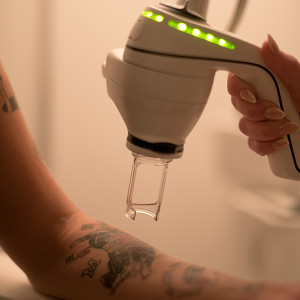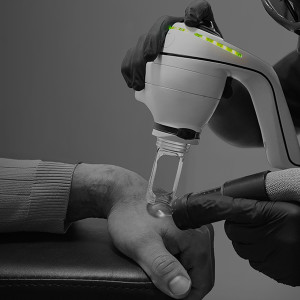Do tattoo removal creams really work?
The decision to remove your tattoo isn’t an easy one, it can take months or years before you’re ready. Once you’ve decided to say goodbye to your old ink, you might be tempted to look for a cheap and easy solution, such as tattoo removal creams, which can be easily bought online and used at home. They may certainly seem a better alternative to some tattoo removal methods that can involve an invasive, surgical excision process. But do they work as well as many tattoo removal creams claim? Well, rarely.
Can you remove a tattoo with a cream?
Whilst a tattoo fading cream may lighten and fade the appearance of your tattooed skin, it’s very unlikely that even the best tattoo removal creams will completely remove it. Tattoo removal cream works by using trichloroacetic acid (TCA) and hydroquinone to remove the top layer of skin (the epidermis). They bleach and lighten your skin by reducing the melatonin and fading the colour pigments. Your tattoo ink, however, is found in the deeper layers of your skin (the dermis) beneath your outer skin. That means that a topical tattoo removal cream will not be able to reach the deep ink particles and fully remove the tattoo. For this reason, these creams are usually not as effective as other tattoo removal methods.
Do tattoo removal creams have side effects?
Some people might find that tattoo removal creams could also have limitations and side effects, and even even cause serious skin reactions. These side effects and limitations could include:
Skin irritation: Tattoo removal creams can cause mild to moderate skin irritation, such as redness, itching, and burning sensation.
Redness: The area of skin where the cream is applied may become red and inflamed.
Itching: Some people may experience itching or a tingling sensation on the treated skin.
Blistering: In some cases, the cream may cause blistering, which can be painful and may take several days or weeks to heal.
Scabbing: The cream may also cause scabbing, which is a natural healing process that can occur after the skin is damaged. Scabs may form and may take several days or weeks to heal.
Scarring: There is a risk of scarring, especially if the cream is not used correctly, or if the person has sensitive skin.
Ineffectiveness: Tattoo removal creams are not as effective as laser tattoo removal and may take several months to show results.
Unreliable results: The process of using tattoo removal cream may take several months to show results, and may not completely remove the tattoo.
Is there a more effective way of getting rid of unwanted tattoos?
The good news is the answer is yes. While a tattoo removal cream may fade your tattoo, laser removal can completely remove your tattoo. Our laser tattoo removal works by using an ultra-low energy laser, which reduces the chance of blistering, permanent scarring or damage to your skin.
Publish Date in article
The team at NAAMA offers customised treatment plans for your personal laser tattoo removal. We factor in the colour, design, size and location of your tattoo, as well as your skin type (which is great for those with dark skin tones or sensitive skin), and future vision for your skin.
Our low-energy tattoo removal lasers significantly reduces the recovery time between each session, which means less downtime between treatments and faster tattoo removal results.
The best way to remove tattoos
Our low-energy tattoo removal lasers significantly reduces the recovery time between each session, which means less downtime between treatments and faster tattoo removal results. Here at NAAMA, we specialise in rapid tattoo removal using our unique laser system that can completely remove your tattoo. Not only that - our treatment is gentle on skin, meaning less downtime between sessions for a quicker removal time.
Publish Date in article
We’re here to help you love your skin, and the before and after results speak for themselves.
For trends in breakthrough laser tattoo removal technology, here are NAAMA's top laser FAQs.
What is the best laser for tattoo removal?
What is the newest laser technology for tattoo removal?










